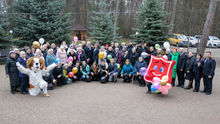Reconciliation Park visit an emotional experience for our Indigenous leaders
- deansimpson7
- Mar 15, 2024
- 3 min read

BY ANTHONY CASTLE
As part of the recent Yakila conference in South Australia, The Salvation Army’s Aboriginal and Torres Strait Islander team visited Colebrook Reconciliation Park on Kaurna Country at Eden Hills in Adelaide’s south.
Once an institution for Aboriginal children who were forcibly removed, Colebrook Reconciliation Park is now a memorial to those children and their families. The team visited the nearby site to pay respects and acknowledge those who once lived on the grounds.
“We were actually reflecting on the late Lowitja O’Donoghue [Indigenous rights advocate] who had passed away,” explains Maria Anderson, the Divisional Aboriginal and Torres Strait Islander Engagement Coordinator for SA/NT. “Colebrook was the place where she was brought up. That’s what led us to go up there, to remember her, knowing that Sorry Day was coming up too.”
The team visited the site just one day prior to the 16th anniversary of the National Apology to the Stolen Generations. The children who lived at Colebrook Home were removed from their families and land because of the government’s policy of assimilation. Some never saw their parents again and suffered the trauma of separation into their adult life. The Colebrook site was host to 350 children who were removed and placed in the home from 1943-1972.
“I often take some of our staff to Colebrook to do cultural awareness training,” Maria says. “The park gives people some insight into the story. Within The Salvation Army, there’s a lot who are unaware of it all, but when they go to the park, they can see it’s real. This is where the house was, where the stolen children lived, this is the yard. People can see for themselves.”

The site has been transformed into a memorial park over the years through the efforts of the Colebrook former residents (Tji Tji Tjuta, ‘many little children’), their families, and other groups. Statues were created to commemorate the grief of the mothers who lost their children during that time. During their visit, The Salvation Army’s Aboriginal and Torres Strait Islander Team gathered at the Grieving Mother statue to spend time in grief and prayer.
“When people get to the statue of the grieving mother, they’re challenged,” Maria explains. “Having spent all three to four days at the Yakila gathering, we were thinking about doing something to bring us down, where we could take the time to reflect, think about our own families who had children taken. No matter what time of the year, I always have tears when I get to the weeping mother.”
Stolen Generations survivors are some of Australia’s most vulnerable people, and many have kept their stories and experiences secret for many years, even decades. An inquiry into the South Australian Government’s removal of Aboriginal children launched last year delivered its preliminary report recently, comparing the predicted level of removal of Aboriginal children now to that of the Stolen Generation.
“In 2024, there are more kids taken away now than when the Stolen Generation was happening,” Maria says. “People live in Adelaide all their lives and don’t know the park is here. This is why I say, ‘go to the site, go to the Kaurna story, where you live and work’. That’s what we’re trying to do, get people to know that part of our journey. We don’t want to repeat this story.”
The Salvation Army personnel and communities are encouraged to visit Colebrook Reconciliation Park and learn more about the Kaurna story.






